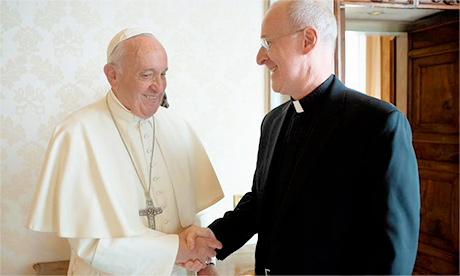Pope Francis has just issued an important document entitled “Querida Amazonia,” or “Beloved Amazon.”
It is a post-synodal apostolic exhortation, that is, the Holy Father’s summing up of the Synod of Bishops for the Pan-Amazonian Region, which took place in October of last year.
The synod gathered Catholic bishops, clergy, theologians and lay people, including indigenous leaders from the region, to reflect on cultural, ecological and religious issues facing the Amazon.
Even though synods have been around for centuries and were given renewed emphasis by the Second Vatican Council in the 1960s, the Amazon synod was the first meeting of its kind to be organized around a distinct ecological territory.
The region contains about 34 million inhabitants, including three million indigenous people from nearly 400 ethnic groups.
Pope Francis sees synods as opportunities for what Jesuits call “group discernment,” during which the Holy Spirit works through discussions and deliberations.
This is one way that the pope tries to engage as many people as possible in important decisions.
Thus, in “Querida Amazonia, ”the pope is reflecting on what happened in that large group discernment.
So, let’s look at five takeaways from “Querida Amazonia.”
To do that, I will follow the pope’s four-part structure in the document and then add one final observation.
First
Francis dreams of a region that fights for the “rights of the poor,” especially those of the “original peoples” of the area.
The pope takes aim at businesses, both national and international, that harm the Amazon and fail to respect the rights of the original peoples and bluntly labels such actions as “injustice and crime.”
We should feel “outrage,” he says, when we see a minority of people profiting from the “poverty of the majority and from the unscrupulous plundering of the region’s natural riches.”
The pope also apologizes for times when the church itself participated in these injustices and crimes.
Second
Pope Francis hopes for a world and a church that will recognize the distinctive cultural riches of the Amazon.
In many places in the region, the globalized economy endangers or threatens “human, social and cultural richness.”
So these distinctive cultures must be nourished, protected and celebrated.
“Each distinct group in a vital synthesis with its surroundings,” he says, “develops its own form of wisdom.”
But to hear this wisdom we need to protect and reverence the cultures from which it came.
Third
“Querida Amazonia ”reiterates some of the most important themes from the pope’s magisterial encyclical on creation, “Laudato Si’.” Grounding his appreciation for the environment in a reverence for God’s creation, he reminds us that everything is connected: “The care of people and the care of ecosystems,” he says, “are inseparable.”
But many economic interests see the Amazon simply as a place of industry or a place where one can withdraw natural resources, even though the equilibrium of the planet “depends on the health of the Amazon region.”
We should, says the pope about the Amazon, “love it, not simply use it.”
Fourth
The pope turns his reflections to the church in the Amazon, and repeatedly stresses “inculturation.”
This is an important theological concept, especially since Vatican II, but really since the beginning of the proclamation of the Gospel, because the Gospel message must always be announced in new ways to new cultures. Continue reading
